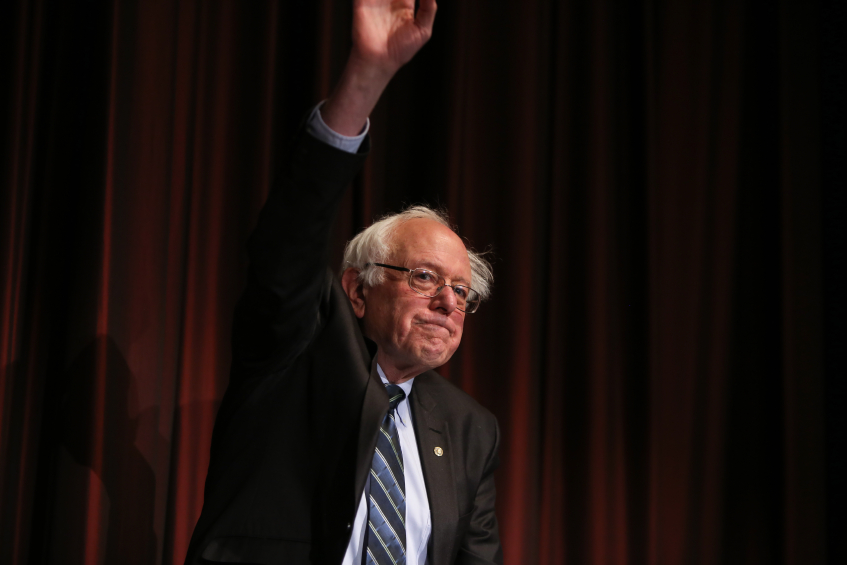Why a Sanders' Supporter Finds It Hard to Back Clinton

For those of us on the left who supported Bernie Sanders’ presidential run, his final capitulation and endorsement of Hillary Clinton proved a bitter pill.
His campaign energized people, many of them young who until he came along felt cynical about electoral politics, and who didn’t believe they would live to see the day when the United States would have a major candidate seriously challenge the two-party system.
For progressives, Bernie Sanders was a real alternative, a man of principle, a public servant dedicated to the public good who with their support could truly revolutionize American politics and society.
To many, his “political revolution” did indeed feel like a peaceful, but revolutionary force. No other candidate had spoken as explicitly and boldly as he did about class, economic and racial injustice, and the growing inequality in the world’s richest nation. Progressives were hopeful, perhaps naïvely, this election cycle would offer them something different.
But when it became clear he could not reach the nomination, the pragmatic senator threw his support behind Clinton and asked his supports to do the same.
For many on of us on the left, deciding whether to follow Sanders’ lead has been no easy task. Many progressives have even considered voting for Donald Trump, to the horror of liberals.
Why would progressive people ever consider this seemingly inexplicable course of action? How can those drawn to a message of democratic socialism even consider supporting a man so at odds with the goals of economic and social justice?
Although this impulse seems paradoxical, even dangerous, there are valid reasons for this, although progressives understand letting – or helping -- Trump win is a risky proposition.
The logic of #BernieOrBust progressives is quite straightforward: Voting for Clinton perpetuates the lesser-evil system they’ve been fighting. By giving their vote to the “safe” liberal, voters continue to give life to this system.
Put another way, by continuing to choose the lesser evil, the entire political spectrum continues to move the right, although perhaps more gradually than under a Trump presidency.
But therein lies the second part of the logic. If Trump were to actually win, he might provide a genuine shock to the system -- and to liberals. He might prove that we need an actual left alternative in this country, rather than what passes for liberalism, which in reality is a center-right ideology (and moving, along with the ultra-right, further in that direction).
A Trump presidency would be disastrous, but it might bring down the system we’ve been forced to tolerate for so long. It might wake up the left and force progressive leaders to act as such. It may finally unite poor blacks and whites and browns, and help build and organize resistance to the neoliberal policies of both parties.
In one observer’s words, “a Trump presidency represents an acceptable cost of inflicting punishment on the Democratic Party for 20 years of selling out ordinary Americans.”
That strategy, while understandable, is a serious gamble, and a potentially costly one. Clinton may be far from the ideal progressive candidate. After all, she is perceived -- rightly, in my opinion -- as insincere, out of touch and unconcerned with issues that affect the working- and middle-classes. And her connections to shady military campaigns make the left all the more nervous.
But the alternative is a man who has brought fascism to America, who has repeatedly expressed, without regret or remorse, incredibly racist, sexist, homophobic things, and who has encouraged vigilante violence more than once, the latest instance involving a “joke” about how “Second Amendment people” could “stop” his opponent.
Can we really afford to allow this man to win? Can we really risk giving Trump, who is perceived, even by a cadre of leading GOP national security experts as a threat to humanity, access to the world’s most powerful military and the world’s largest nuclear arsenal? I’m not sure we can. Even Sanders has stated that the first step in the political revolution is defeating Trump.
To be clear, Sanders supporters -- and progressives more generally -- owe the Democratic Party nothing. This is a party that has for decades abandoned the working and middle classes in favor of oligarchs, who now have made the Democratic Party their home. This is a party that has failed to live up to (or even keep alive) the ideals of Franklin Roosevelt and Lyndon Johnson.
In other words, this is a party at least partly responsible for the mess in which we find ourselves, where people feel so alienated from the political process, so abandoned by their political leadership, that they are enthusiastically supporting a madman with authoritarian ambitions.
So what are progressives to do? It seems to me that the intelligent, long-term strategy should involve working to defeat Trump but keeping the pressure on Clinton and the Democratic Party. Progressives need to remind them, constantly and forcefully, that they can no longer get away with ignoring ordinary workers and citizens, can no longer allow the political process to be hijacked by opportunistic oligarchs and hatemongers.
After all, even if Trump is defeated, his supporters will not go away, and neither will their frustrations and anger, which although manifested in ugly, racist, hateful ways come from a very real, very deep-seated sense of insecurity and fear about the future.
So we need to defeat Trump, yes, but that’s only the beginning of what we should see -- and should structure -- as a social movement.
Eladio Bobadilla, from Durham, N.C., is a fourth-year Ph.D. student in Duke’s history department.